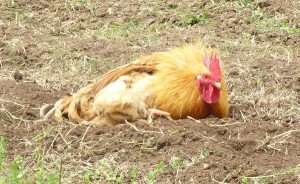
He lays on one side, flopping in the dirt, with one wing slightly outstretched, flicking one leg rapidly up and down. He rolls over onto his back, kicks and writhes in the dirt.
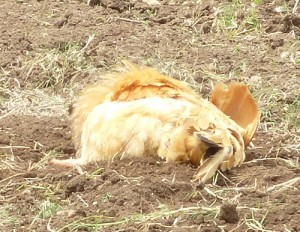
At first glance, it may seem like something is wrong with this chicken. Is there?
No. He’s just taking a dust bath. This is his normal way of staying clean and fending off parasites like mites and fleas.
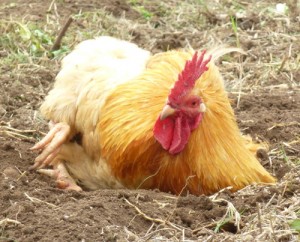 He makes a depression in the soil, settles himself down into it, and proceeds to get himself as fully covered with dust as he can. When he’s done, he shakes off the dust and walks away.
He makes a depression in the soil, settles himself down into it, and proceeds to get himself as fully covered with dust as he can. When he’s done, he shakes off the dust and walks away.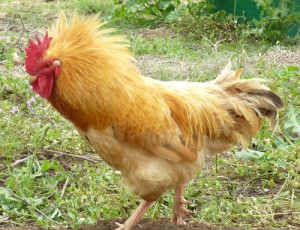
The soil that chickens dust with and work between their feathers helps to absorb excess oil and moisture, helps to clean their feathers, and helps to eliminate mites and other external parasites.
Chickens will take dust baths in soil, sand, wood shavings and just about any type of loose material that they can find. Soil and sand seem to be some of the best materials.
Dust bathing is so natural to chickens, they will go through the motions of giving themselves a dust bath even when kept in a cage with no access to the soil.
If your chickens don’t have a place to take a dust bath, you can build a simple wooden box with no lid. To be large enough, it should be about 6 to 12 inches tall, with sides that are about 1 1/2 feet long. Then fill it with soil or sand.
If your chickens begin to have trouble with mites or lice, we recommend using Murray’s Dusting Powder, which is made from 100% food grade diatomaceous earth.
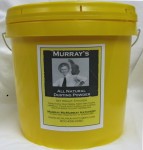 The chickens will dust-bathe in it just like they would soil. The razor sharp particles of the diatomaceous earth are very effective at destroying mites and lice.
The chickens will dust-bathe in it just like they would soil. The razor sharp particles of the diatomaceous earth are very effective at destroying mites and lice.



I make up a potion which consists of more or less equal parts of the following:
soil, wood ashes, sand, peat moss, and diatomaceous earth. I expend a fair amount of energy gathering and binding together all the ingredients. The process includes my wearing of a dust mask due to all the particulate matter swirling about my head while I’m working. On hot days this task leaves quite a lot to be desired, but I am nothing if not utterly devoted to my girls; Lucy, LuLu, Fiona, and Ms. Pearlie.
Originally, I would place half the mixture in a large peat pot in the coop for rainy day ablutions and the remainder in a shallow depression in the chicken yard. The girls quickly determined that the peat pot served them much better as a place to lay their eggs than as a bathtub. Never mind the three actual nest boxes available to them in the coop. I soon abandoned the idea of indoor bathing facilities while at least two of the girls happily, if not defiantly, continue to lay their eggs in the pot.
As to the chicken yard bathing area, they do use it on the days they remain confined in the yard. I always sense from them, however, an air of injured feelings while they avail themselves of my painstakingly constructed and, in my mind, luxurious amenity. It puts their beaks out of joint, being restricted to the yard. So it follows that they want me to apprehend how little use they have for bathing, or doing much else, in confinement.
The moment the gate swings open to the larger garden, all four girls toddle right out with enough clucking and clacking to convince me that they couldn’t be happier. They make a bee line to one of two places; the garden bed under the eves at the back of the house, between the rhododendrons and ferns, or to the bed under the garage eves, among the clematises, the roses, and the day lilies. They will spend what seems like hours in either one of those places,wallowing in the unadulterated, unamended “dirt,” gossiping among themselves, taking in the sun, having a generally grand time of it. They are nothing, if not self-satisfied. They won’t return to the yard and the coop until the sun commences to go down.
Nowadays, I sometimes throw a handful or two of ashes or peat moss into the garden beds against house and garage. I no longer wear myself out mixing up my dirt bath potion. I know when I’ve been bested.
Thanks for the great article on dust bathing!! My chicken friend and mentor forwarded your newsletter and I am enjoy many of the articles. We just started with 5 chicks: 3 black sex-linked and 2 australorps. We love watching them and hearing their many sounds.
This applies to hens as well. I have a large number of depressions in the yard where they have decided to make their bath holes. My birds have about three acres to run in but the place they love the most is up under the porch where there is no grass to make it hard to dig their bath.
Mine like to gather under my porch too. It is so funny to come out and hear all the noises coming from under the porch!
This was nice and informative. The pictures really helped one to understand the process of dust bathing. Thanks.
Nice way to up-sell your product, commendable even. My chickens like to take a “dust bath” on the carpet of my front door. And that’s not all they “doo”, if you know what I mean. There other favorite place is my neighbors front yard…who knew that over a foot deep was just about right. ..especially since I live in a desert and they have literally thousands of choices! The upside is I get some great fertilizer with every step.
hello
my seven chickens from you are very happy..they have dug dust baths up close to their coop (several)
Would it be a good idea (preventative) to get some of your dusting powder and put it in each of the baths??? stage..Hope those feathers grow back…they look very “naked” in some areas!! Any tips on helping with good health at this time? We are in Southern California(fairly warm)…thanks so much for your ALWAYS helpful comments..shirley
Yes, it is a perfect idea to place Murray’s dusting powder in the pre-designated bathing areas. You could try putting Avia Charge in water to help with feather re-growth.
https://www.mcmurrayhatchery.com/avian_charge_2000.htmlI want to buy some of the mite dusting powder. How do I go about it?
This was real helpful as I’m new to chickens & I had heard about dust baths, but didn’t have a clue as to what to use or the size of the container I needed to buy. Thank you this was helpful. I love you e-mail news letter & have learned so much from it.
Great article but it should mention that baby chicks just a few days old will begin to dust-bathe and will go through all the motions. If they don’t have access to soil and sand, they’ll bathe in starter mash.
Thank you for the informative articles. Could you write an article on why chickens leave their eggs while setting and how to keep them on their eggs. Thanks.
That is a great idea for an article. We will look into it.